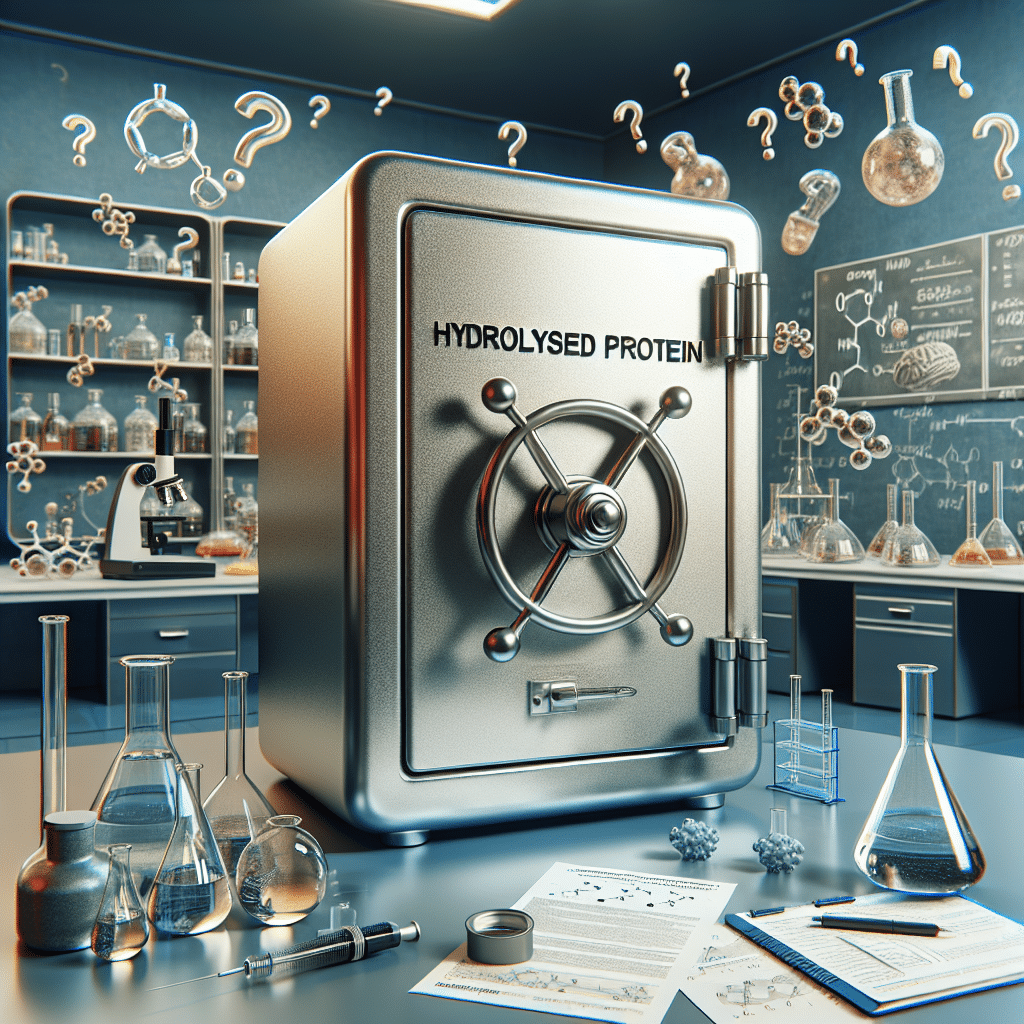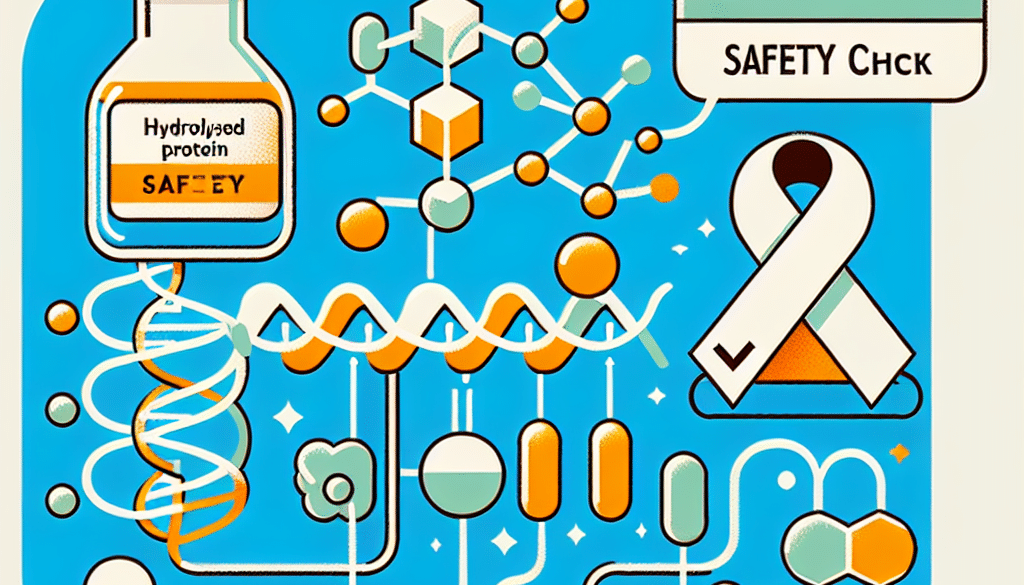Is Hydrolysed Protein Safe?
-
Table of Contents
- Hydrolyzed Protein Safety: A Comprehensive Analysis
- Understanding Hydrolyzed Protein
- The Safety Profile of Hydrolyzed Protein
- Allergenicity Concerns
- Toxicity and Digestibility
- Case Studies and Research Findings
- Regulatory Perspectives on Hydrolyzed Protein
- Considerations for Consumers
- Conclusion: The Verdict on Hydrolyzed Protein Safety
- Discover ETprotein’s High-Quality Protein Products
Hydrolyzed Protein Safety: A Comprehensive Analysis

Protein is a fundamental nutrient in the human diet, essential for building and repairing tissues, making enzymes and hormones, and supporting overall health. Hydrolyzed protein, a form of protein that has been broken down into smaller peptides or amino acids, has gained popularity in various dietary supplements and food products. However, consumers often question the safety of hydrolyzed protein. This article delves into the science behind hydrolyzed protein and its safety for human consumption.
Understanding Hydrolyzed Protein
Before assessing the safety of hydrolyzed protein, it is crucial to understand what it is and how it is produced. Hydrolysis is a chemical process that uses water to break down protein molecules into smaller chains of amino acids, known as peptides, or even into individual amino acids. This process can occur naturally, such as during digestion, or it can be induced using enzymes or acids in a controlled environment.
Hydrolyzed proteins are commonly found in:
- Infant formulas
- Sports nutrition products
- Weight management shakes
- Medical nutrition supplements
- Flavor enhancers in food products
The Safety Profile of Hydrolyzed Protein
Hydrolyzed proteins are generally recognized as safe (GRAS) by the U.S. Food and Drug Administration (FDA) when used in accordance with good manufacturing practices. The safety of hydrolyzed protein has been evaluated in numerous scientific studies, which have looked at various aspects such as allergenicity, toxicity, and digestibility.
Allergenicity Concerns
One of the primary safety concerns with hydrolyzed protein is its potential to cause allergic reactions. Proteins are the components in food that typically trigger allergies. The hydrolysis process can reduce the allergenic potential of proteins by breaking down the epitopes—the parts of the protein that elicit an immune response. For example, hydrolyzed infant formulas are often recommended for babies at risk of developing allergies, as they are less likely to provoke an allergic reaction compared to formulas with intact proteins.
Toxicity and Digestibility
Another aspect of safety is the potential toxicity of hydrolyzed proteins. Studies have shown that hydrolyzed proteins are typically non-toxic and are well-tolerated by the body. Additionally, because hydrolyzed proteins are already partially broken down, they can be easier to digest, especially for individuals with certain gastrointestinal conditions or those who have difficulty digesting intact proteins.
Case Studies and Research Findings
Several studies have been conducted to assess the safety and benefits of hydrolyzed proteins. For instance, research on hydrolyzed whey protein has demonstrated its effectiveness in promoting muscle recovery and growth, making it a popular choice among athletes. Furthermore, clinical trials have shown that hydrolyzed collagen supplements can support skin health and joint function.
Despite the positive findings, it is important to consider individual studies and their methodologies when evaluating the safety of hydrolyzed protein. The source of the protein, the method of hydrolysis, and the degree of hydrolysis can all influence the safety and efficacy of the final product.
Regulatory Perspectives on Hydrolyzed Protein
Regulatory agencies around the world, including the FDA and the European Food Safety Authority (EFSA), have established guidelines for the use of hydrolyzed proteins in food and supplement products. These guidelines ensure that hydrolyzed proteins meet specific purity and quality standards before they are deemed safe for consumption.
Considerations for Consumers
When incorporating hydrolyzed proteins into their diets, consumers should consider the following:
- Their individual dietary needs and health conditions
- The quality and source of the hydrolyzed protein
- Any potential allergies or sensitivities to the source material
- The reputation and transparency of the manufacturer
Conclusion: The Verdict on Hydrolyzed Protein Safety
In conclusion, hydrolyzed proteins are generally safe for most people when consumed as part of a balanced diet and produced according to regulatory standards. The hydrolysis process can reduce allergenicity and improve digestibility, making these proteins a valuable option for certain populations. However, consumers should always consider their unique health circumstances and choose high-quality products from reputable sources.
Discover ETprotein’s High-Quality Protein Products
If you’re looking for safe and high-quality hydrolyzed proteins, ETprotein offers a range of products that meet stringent safety and quality criteria. Their selection includes organic rice protein, pea protein, and various seed proteins, all characterized by a neutral taste, non-GMO, and allergen-free attributes. With purity levels exceeding 98%, ETprotein caters to industries such as nutraceuticals, pharmaceuticals, and food and beverage, ensuring that you have access to the best protein supplements on the market.
About ETprotein:
ETprotein, a reputable protein and L-(+)-Ergothioneine (EGT) Chinese factory manufacturer and supplier, is renowned for producing, stocking, exporting, and delivering the highest quality organic bulk vegan proteins and L-(+)-Ergothioneine. They include Organic rice protein, clear rice protein, pea protein, clear pea protein, watermelon seed protein, pumpkin seed protein, sunflower seed protein, mung bean protein, peanut protein, and L-(+)-Ergothioneine EGT Pharmaceutical grade, L-(+)-Ergothioneine EGT food grade, L-(+)-Ergothioneine EGT cosmetic grade, L-(+)-Ergothioneine EGT reference grade and L-(+)-Ergothioneine EGT standard. Their offerings, characterized by a neutral taste, non-GMO, allergen-free attributes, with L-(+)-Ergothioneine purity over 98%, 99%, cater to a diverse range of industries. They serve nutraceutical, pharmaceutical, cosmeceutical, veterinary, as well as food and beverage finished product distributors, traders, and manufacturers across Europe, USA, Canada, Australia, Thailand, Japan, Korea, Brazil, and Chile, among others.
ETprotein specialization includes exporting and delivering tailor-made protein powder and finished nutritional supplements. Their extensive product range covers sectors like Food and Beverage, Sports Nutrition, Weight Management, Dietary Supplements, Health and Wellness Products, and Infant Formula, ensuring comprehensive solutions to meet all your protein needs.
As a trusted company by leading global food and beverage brands and Fortune 500 companies, ETprotein reinforces China’s reputation in the global arena. For more information or to sample their products, please contact them and email sales(at)ETprotein.com today.












